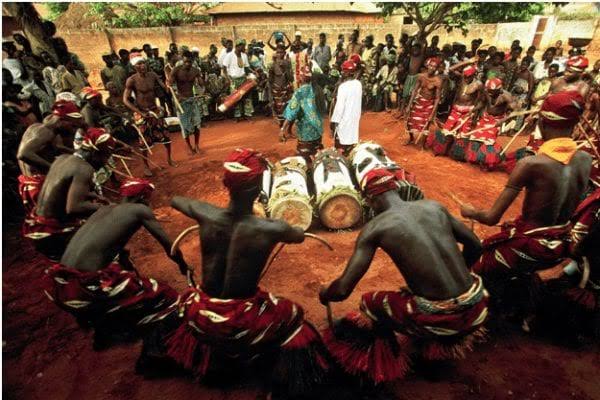African Culture is expressed in its arts and crafts, folklore and religion, clothing, cuisine, music and languages. Expressions of culture are abundant within Africa, with large amounts of cultural diversity, found not only across different countries but also within single countries.
African culture is embedded in strong moral considerations. It has a system of various beliefs and customs which every individual ought to keep in order to live long.

Every culture has a dual tendency, a tendency towards stability and a tendency toward change.
Surprisingly, on numerous occasions even intelligent and knowledgeable Africans erroneously and inadvertently conceptualize culture as drumming and dancing’ and therefore fail to see any contribution culture makes or made to the struggle for socio-economic development.
The culture of Africa is incredibly interesting due to the fact it is varied, depending on which country you visit.
The continent
The continent is home to diverse populations, many of which have been influenced by external factors.
Each country has its own tribes, languages and cultural differences. Even small African countries like Uganda have more than thirty established tribes. We will now take a look at some of the most well-established products of African culture including tribes, food, arts and language.
HERE ARE THE FIVE IMPORTANT ASPECTS OF THE AFRICAN CULTURE
TRIBES: The African culture is diversified with many different tribes. These tribes have different languages, foods, dressing, arts, behaviours that make them different and unique.
Every tribe can be identified through a behavioural pattern; this is why the african man is always able to identify his tribesmen even in a desert.
FOOD: The African foods are very and could be tagged as african dishes. It has a very sweet local taste, highly nutritious and very organic.
The environment plays a huge part in what kinds of foods are consumed in different parts of the African continent. Most cuisines include fruit, grain, vegetables, milk and meat products. Quite a number of cultural groups have very similar foods in their cuisines. For example the banku (corn meal) in Ghana is similar to The eastern Nigerian nni oka (corn meal), the difference is in the process of preparation.
The visual storytelling in African Culture
ARTS: Africans are one of the biggest contributors to sculptural art. The art form of African sculpture dates back thousands of years with some of the earliest sculptures being found in Egypt.
 The african arts are very unique, superb and tells a powerful story. Africans are passionate and emotional people; their paintings are not empty, but dipped in the past, present and the future. It is the African arts that tells a specific story of how the mother toils day a night for the wellbeing of the child, it is the African arts that describes war; with a picture of a child holding crumbs of bread, with eyes soaked in tears. It is the African art that tells the story of a man that crossed many seas to fight the battle for the freedom of his land!
The african arts are very unique, superb and tells a powerful story. Africans are passionate and emotional people; their paintings are not empty, but dipped in the past, present and the future. It is the African arts that tells a specific story of how the mother toils day a night for the wellbeing of the child, it is the African arts that describes war; with a picture of a child holding crumbs of bread, with eyes soaked in tears. It is the African art that tells the story of a man that crossed many seas to fight the battle for the freedom of his land!
 African arts and craft also include sculpture, weaving, beading, painting, pottery, jewellery, headgear and dress.
African arts and craft also include sculpture, weaving, beading, painting, pottery, jewellery, headgear and dress.
Masks are usually a representation of religious and spiritual beliefs. They are used for traditional ceremonies to honour deities or ancestors.
African Arts are not just mere arts, but powerful, spiritual, emotional and also an agent of change.
ATTIRES AND SOUND
MUSIC: African music is as diverse as the people, and although it has been influenced by music from the western world, rhythmically, one can easily depict the African music.
Traditional music in southern Africa, Nigeria, Ghana, Kenyan and most countries of Africa, usually involves drumming and singing, and such instruments as the thumb piano, the gong, the xylophone, the flute amongst others.
CLOTHING: the type of clothing worn across Africa varies from north, south, east and west, is greatly influenced by religious beliefs and traditional customs.
Some cultures wear colourful attire, while others wear less colour but include shiny threads in their dressing with minimal jewellery.
There are thousands of indigenous languages and dialects spoken in Africa. Every African country has its own languages, However due to the fact that many African countries were once part of European colonies, many people are able to speak Creole or Pidgin versions of English, Portuguese of French. In Northern Africa Arabic is spoken, whereas in East Africa Swahili is the dominant language.
The African culture is diversified and beautiful.
Start planning a trip to African, a visit will convince you.
#Engee

